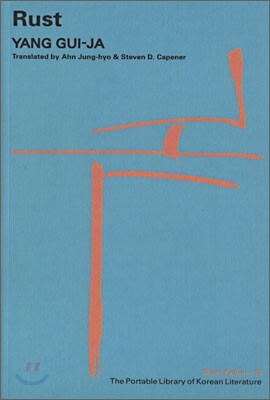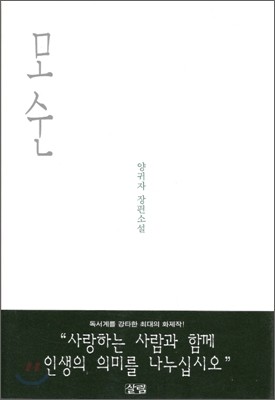Yang Gui-ja (born 1955) is a South Korean writer.
Life
Yang Gui-ja was born in Jeonju, North Jeolla Province, and graduated from Wonkwang University with a degree in Korean Literature. Yang made her literary debut in 1978 when her short story "Dasi sijakaneun achim" (다시 시작하는 아침 Starting a New Morning) won the New Writer's Contest hosted by the monthly Literature & Thought. In 1987 she achieved popular success with the release of her collection of linked short stories Wonmidong saramdeul (원미동 사람들 A Distant and Beautiful Place), for which she is still most famous. This collection was a painstaking depiction of the lives of people on the periphery of industrial culture. Yang is the recipient of the Yu Ju-hyeon Literary Award, the Yi Sang Literary Award, and the Hyundae Literary Award.
Writing
Yang's fiction from the 1980s was informed by the prevailing spirit of social protest. Even though she did not adopt specific ideological positions, the belief that collective action can affect positive changes in people's lives still underpinned much of her works. As the prevailing mood of disillusionment began to supplant the earlier decade's fervor in the consumer culture of the 1990s, Yang's fiction underwent change as well. Her works written in the 1990s reflect the author's agonizing search for new hope after the dissolution of her former ideals. "Sumeun kkot" (숨은 꽃 The Hidden Flower), in particular, offers a semi-autobiographical account of a writer setting out to find her way out of confusion and cynicism. In Cheonmachong ganeun gil (천마총 가는 길 The Road to Chenmachong), the protagonist searches for a means to come to terms with unforgotten memories of past trauma and the sense of powerlessness that dominates her present life.
Mosun (모순 Contradictions), Yang's most popular work from the 1990s, is a coming-of-age tale that explores the paradoxes and contradictions of the human condition and delves into the meaning of personal happiness. The book opens with an epiphany as the protagonist realizes that her entire energy must be devoted to her own life. She struggles over whom to marry with an awareness of consequences gleaned from her mother and her aunt, twin sisters. A host of binary oppositions is also presented in the lives of the men around her: a wannabe gang boss brother, an Ivy League cousin, an alcoholic schizophrenic father, a steadfast but rigid uncle, and her two suitors. Yang skillfully develops these characters in increasingly complex threads as the novel unfolds in a series of surprises.
A Distant and Beautiful Place, Yang's most representative work, is a critically acclaimed collection of stories based on the author's own experience of living in Wonmi-dong. Populated by disaffected, discontented people—failed poet, neighborhood grocers who engage in price war, a factory worker exploited by the management—Wonmi-dong is no longer a rural community bound by neighborly love and agrarian ethos, nor an urban town bathed in optimism, but a mere breeding ground for petty jealousies, hypocrisies, and vain desires. It is Yang's observant prose filled with humorous and at times poignant sketches of the people at the margins of urban glitter and industrial boon that established her reputation.
Yang Gui-ja wurde 1955 als zweitjüngstes von sieben Geschwistern geboren. Sie hatte fünf ältere Brüder und eine jüngere Schwester. "Im Dorf nannten sie uns die 'von Söhnen Gesegneten'. Fünf kräftige Jungs hintereinander und danach wie gerufen zwei Töchter." (aus Der Gipfel Han'gyeryŏng).[2]
1960 starb der Vater, weshalb der älteste Bruder die Aufgabe übernehmen musste, für den Lebensunterhalt der großen Familie zu sorgen. Ihr Schuldgefühl gegenüber dem ältesten Bruder drückt sich in der Kurzgeschichte Der Gipfel Han'gyeryŏng aus. Der Kritiker Hong Chŏng-sŏn wies darauf hin, dass aus den Erzählungen von Yang Gui-ja ein Gefühl tiefer Scham angesichts ihres Lebens sowie der Wunsch nach Wiedergutmachung gegenüber dem ältesten Bruder spreche.
1967 besuchte Yang Gui-ja die Mittelschule, verbrachte die meiste Zeit in der Bibliothek und las viel. 1970 ging sie zur Oberschule, nahm an verschiedenen Literaturwettbewerben teil und begann ambitioniert zu schreiben. 1974 wurde sie als Stipendiatin für ein Literaturstudium an der Universität Wongwang in Iksan ausgewählt. Nach dem Abschluss des Studiums 1978 arbeitete sie als Koreanischlehrerin an der Honam-Oberschule der Stadt Chŏngŭp. Aber nach einem Monat trat sie zurück und bewarb sich für die Kŭmsang-Oberschule auf einer kleinen Insel. Im Mai 1980 debütierte sie mit den zwei Erzählungen Neu beginnender Morgen und Die geschlossene Tür in der Literaturzeitschrift Literatur und Gedanken (Munhak sasang). 1980 gab sie ihre Tätigkeit als Lehrerin auf, heiratete und zog in den Seouler Vorstadtort Wonmidong um. Ab 1981 schrieb sie Erzählungen und publizierte schließlich 1985 ihren ersten Sammelband und 1987 Die Leute von Wonmidong. Die Serienerzählungen erhielten große Resonanz, und Yang Gui-ja wurde eine der repräsentativsten Autoren der 80er Jahre. Nach diesem Erfolg veröffentlichte sie Der Weg zum Ch'ŏnmach'ong. In dieser produktiven Zeit verließ sie den Ortsteil Wonmidong, in dem sie zehn Jahre gelebt hatte, und zog nach Kugidong, Seoul um. Ihr Roman Ich begehre das, was mir verboten ist führte zum Feminismusstreit und wurde verfilmt. Für die Erzählung Die verborgene Blume, die sie im selben Jahr veröffentlichte, erhielt sie den Yi-Sang-Literaturpreis. 1993 publizierte sie den dritten Sammelband Auch Trauer wird zu Kraft. Danach konzentrierte sie sich auf Romane. Sie betonte die notwendige Veränderung des Schriftstellerbewusstseins, um auf den Wandel der Zeit zu reagieren, und forderte die direkte Kommunikation mit den Lesern. Außerdem vertrat sie den Standpunkt, Literatur solle die elitäre Attitüde fallen lassen und ihre eigentliche Substanz, das Erzählerische und die Ergriffenheit zurückgewinnen. Der 1995 publizierte Roman Tausendjährige Liebe wurde ein Bestseller, ebenso war der Roman Der Widerspruch (1998) einen großen Publikumserfolg.[3]
Su obra temprana más conocida es Los vecinos de Wonmi-dong (Wonmi-dong saramdeul), que retrata el aislamiento y la alienación de las pequeñas ciudades como resultado de la modernización.10 Durante los años noventa su ficción se volvió más personal y publicó varias obras que tuvieron una gran popularidad, entre ellas Contradicciones (Mosun), que fue la novela coreana más vendida de 1998.11
Obras en coreano (lista parcial)
El pájaro sordo (1985)
Junto al río de Babilonia (1985)
Los vecinos de Wonmi-dong (1987)
Esperanza (1990)
Espero lo que está prohibido para mí (1992)
La tristeza también da fuerza (1993)
Un amor de mil años (1995)
Contradicciones (1998)
L'un de ses premiers travaux les plus connus est sa nouvelle Voisins à Wonmi-dong (Wonmidong saramdeul), qui dépeint l'isolement et le statut aliéné des petites villes après la modernisation rapide de la Corée du Sud5. Ce travail a aussi été publié en anglais sous le titre A distant and beautiful place. Pendant les années 1990, ses histoires sont devenues de plus en plus personnelles, avec toute une série de travaux populaires auprès du grand public, à commencer par son roman Contradictions (Mosun), qui fut un best-seller en 19986.
1955年7 月17日、全羅北道全州市 に生まれる。全州女子高等学校を卒業し、文芸奨学生として円光大学校入学。大学を卒業した1978年に『다시 시작하는 아침(また始まる朝)』で月刊文芸誌『문학사상(文学思想)』の新人賞を受賞し、文壇デビューした。1990年代の代表的の作家の一人である。
初期の作品は、社会から疎外された人々に対して暖かい視線で描かれた内容が多かった。1987年に発表した『원미동 사람들(遠美洞の人々)』は、都市開発のためソウルを離れて町外れに住む、貧しいながらも善良に生きる人々の話である。1990年に発表した初の長編『잘가라 밤이여(さよなら夜よ)』は翌年に『희망(希望)』で出版された。この小説には大学受験に失敗した浪人生の主人公と無能な父、ホステス、故郷を離れたお爺さんなど様々なキャラクターが登場する。
1990年代に発表した作品は大衆性と商業性にも優れた才能があることを証明するものだった。攻撃的フェミニズムに対する論争があった『나는 소망한다 내게 금지된 것을(私は望む私に禁止されたことを)』、時空を超えるファンタジー技法で書かれた恋物語『천년의 사랑(千年の恋)』、20代女性の主人公が二人の男の間で葛藤しながら人生の矛盾を見つける内容の『모순(矛盾)』が引き続きベストセラーとなった。 現在はHongJi書林の代表を勤めている。
양귀자(1955~ )는 대한민국의 소설가다.
생애
양귀자는 1955년 전라북도 전주에서 태어났다. 5세 때 아버지가 돌아가신 후 어머니와 큰오빠가 실질적인 가장으로 생계를 책임졌다. 오빠들의 영향으로 만화가 주된 독서 체험인 평범한 학생이었지만, 이광수의 장편소설 《유정》을 읽고 문학의 세계에 빠져들었다. 고등학교 재학 중에 전국 고교생 문예 작품 현상모집에 당선되어 문예 장학생으로 원광대 국문과에 입학했다. 재학 중에는 학보사에서 기자로 활동했고, 졸업 후 2년 동안은 중‧고등학교 교사와 잡지사 편집자로 일했다.
1978년에 〈다시 시작하는 아침〉으로 《문학사상》 신인상을 수상하면서 데뷔했다. 두 번째 소설집으로 출간한 연작 장편 《원미동 사람들》(1987)이 상업성과 문학성, 시대적 의미를 겸비했다는 평가를 받으며 크게 주목받았다. 이어진 장편소설 《희망》(1990)의 실패 이후 양귀자는 주로 대중소설 창작에 치중했다. 페미니즘 논쟁을 불러일으킨 《나는 소망한다 내게 금지된 것을》(1992)은 영화와 연극으로도 공연될 정도로 인기를 끌었으며, 동양적 정서를 현대화한 《천년의 사랑》(1995)은 30만 부 넘게 팔리는 베스트셀러가 되었으며, 1998년에 발표한 《모순》까지 연달아 성공했다. 이상문학상(1992), 현대문학상(1996) 등을 수상하였다.
작품 세계
양귀자는 1980년대까지 도시 소시민의 삶과 애환을 사실주의적 스타일로 재현한 작품들을 다수 발표했다. 1990년대 이후에는 페미니즘 등의 사회적 이슈나 비현실적인 소재를 다룬 장편소설 창작에 집중하여 대중들의 인기를 얻었다. 리얼리즘에서 페미니즘을 거쳐 대중소설에 이르기까지 다양한 변화를 보여준 양귀자의 소설에 대한 평가는 다소 논쟁적이다.
작가의 대표작이라 할 수 있는 연작소설 《원미동 사람들》(1987)은 한국의 급속한 근대화, 도시화가 완성되는 1980년대 서울 외곽의 변두리 동네를 배경으로 서민들의 삶과 애환을 따뜻한 시선으로 담담하게 그려낸 수작이다. 흔히 ‘일상적 리얼리즘’의 대표작으로 언급되는 이 작품을 계기로 양귀자는 1980년대를 대표하는 작가 중 한 사람으로 발돋움하게 되었다.
1990년대 이후 양귀자의 대중적인 장편소설들은 시대의 요구를 적극 반영함으로써 대중성을 확보했다는 호평도 받았지만, ‘작가의식의 소멸’이라는 거센 비난을 받기도 했다. 페미니즘적인 소재를 파격적인 스토리에 담아낸 《나는 소망한다 내게 금지된 것을》 역시 대중적 호응을 얻었지만, 여성문제에 대한 인식부족, 대중에의 영합이라는 측면에서 오히려 반(反)페미니즘적 소설이라는 비난도 받았다.
주요 작품
1) 소설집
《귀머거리새》, 민음사, 1985.
《원미동 사람들》, 살림, 1987.
《지구를 색칠하는 페인트공》, 살림, 1989.
《슬픔도 힘이 된다》, 문학과지성사, 1993.
《길모퉁이에서 만난 사람》, 살림, 1993.
《비 오는 날이면 가리봉동에 가야 한다》, 삼성, 1995.
《천마총 가는 길》, 열림원, 1995.
《곰 이야기 외》, 현대문학, 2003.
《다시 시작하는 아침》, 푸르메, 2007.
2) 장편소설
《희망》, 살림, 1990.
《나는 소망한다 내게 금지된 것을》, 살림, 1992.
《천년의 사랑》, 살림, 1995.
《모순》, 살림, 1998.
3) 장편동화
《누리야 누리야》, 쓰다, 2015.
4) 산문집
《엄마노릇 마흔일곱 가지》, 열림원, 1995.
《삶의 묘약》, 샘터사, 1996.
《오늘보다 다른 내일을》, 민예사, 1999.
《부엌신》, 쓰다, 2013.
수상 내역
1989년 유주현문학상
1992년 이상문학상
1996년 현대문학상
1999년 21세기문학상





